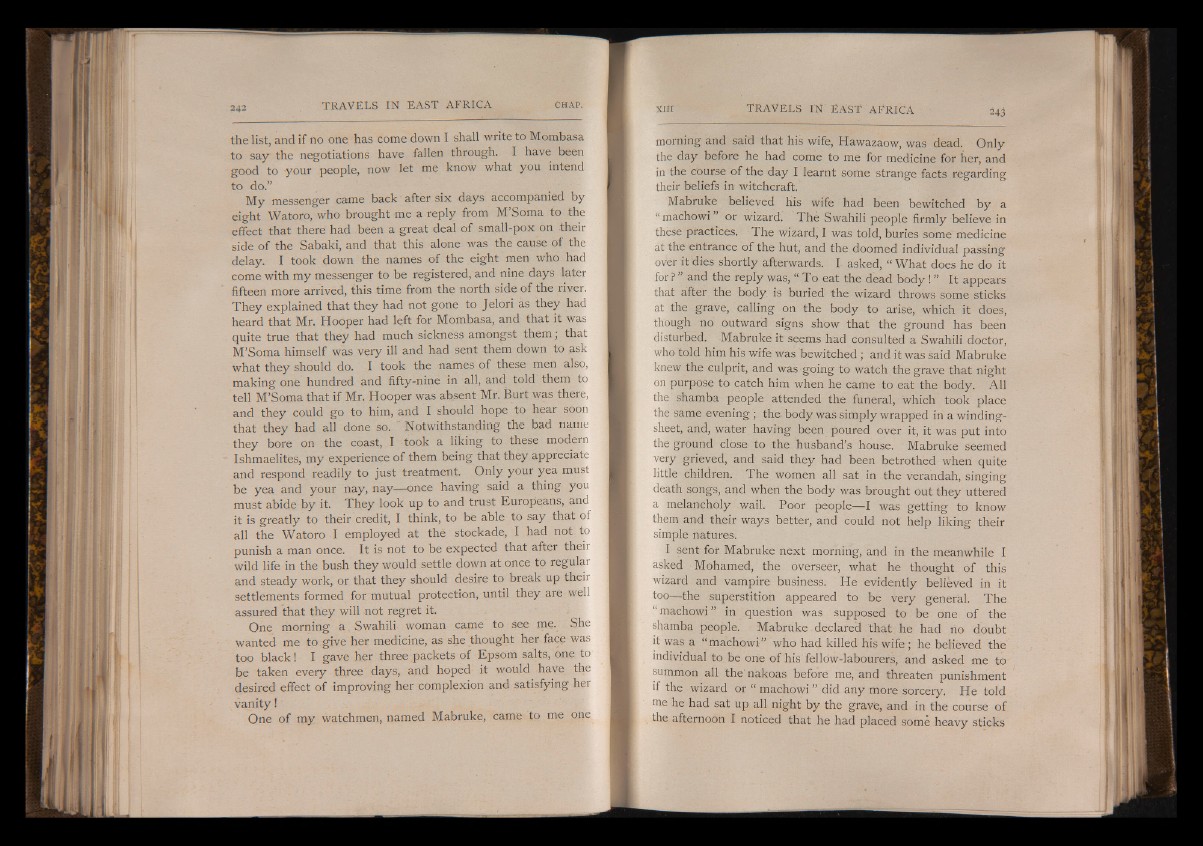
the list, and if no one has come down I shall write to Mombasa
to say the negotiations have fallen through. I have been
good to your people, now let me know what you intend
to do.”
My messenger came back after six days accompanied by
eight Watoro, who brought me a reply from M’Soma to the
effect that there had been a great deal of small-pox on their
side of the Sabaki, and that this alone was the cause of the
delay. I took down the names of the eight men who had
come with my messenger to be registered, and nine days later
fifteen more arrived, this time from the north side of the river.
They explained that they had not gone to Jelori as they had
heard that Mr. Hooper had left for Mombasa, and that it was
quite true that they had much sickness amongst them ; that
M’Soma himself was very ill and had sent them down to ask
what they should do. I took the names of these men also,
making one hundred and fifty-nine in all, and told them to
tell M’Soma that if Mr. Hooper was absent Mr. Burt was there,
and they could go to him, and I should hope to hear soon
that they had all done so. Notwithstanding the bad name
they bore on the coast, I took a liking to these modern
Ishmaelites, my experience of them being that they appreciate
and respond readily to just treatment. Only your yea must
be yea and your nay, nay— once having said a thing you
must abide by it. They look up to and trust Europeans, and
it is greatly to their credit, I think, to be able to say that of
all the Watoro I employed at thé stockade, I had not. to
punish a man once. It is not to be expected that after their
wild life in the bush they would settle down at once to regular
and steady work, or that they should desire to break up their
settlements formed for mutual protection, until they are well
assured that they will not regret it.
One morning a Swahili woman cams to see me. She
wanted me to give her medicine, as she thought her face was
too black ! I gave her three packets of Epsom salts, one to
be taken every three days, and hoped it would have the
desired effect of improving her complexion and satisfying her
vanity !
One of my watchmen, named Mabruke, came to me one
morning and said that his wife, Hawazaow, was dead. Only
the day before he had come to me for medicine for her, and
in the course of the day I learnt some strange facts regarding
their beliefs in witchcraft.
Mabruke believed his wife had been bewitched by a
“ machowi or wizard. The Swahili people firmly believe in
these practices. The wizard, I was told, buries some medicine
at the entrance of the hut, and the doomed individual passing
over it dies shortly afterwards. I asked, “ What does he do it
for ? and the reply was, “ To eat the dead body 1 ” It appears
that after the body is buried the wizard throws some sticks
at the grave, calling on the body to arise, which it does,
though no outward signs show that the ground has been
disturbed. Mabruke it seems had consulted a Swahili doctor,
who told him his wife was bewitched ; and it was said Mabruke
knew the culprit, and was going to watch the grave that night
on purpose to catch him when he came to eat the body. All
the shamba people attended the funeral, which took place
the same evening; the body was simply wrapped in a winding-
sheet, and, water having been poured over it, it was put into
the ground close to the husband’s house. Mabruke seemed
very grieved, and said they had been betrothed when quite
little children. The women all sat in the verandah, singing
death songs, and when the body was brought out they uttered
a melancholy .wail. Poor people1— I was getting to know
them and their ways better, and could not help liking their
simple natures.
I sent for Mabruke next morning, and in the meanwhile I
asked Mohamed, the overseer, what he thought of this
wizard and vampire business. He evidently believed in it
too— the superstition appeared to be very general. The
“ machowi ” in question was supposed to be one of the
shamba people. Mabruke declared that he had no doubt
it was a “ machowi ” who had killed his wife; he believed the
individual to be one of his fellow-labourers, and asked me to
summon all the'nakoas before me, and threaten punishment
if the wizard or I machowi ” did any more sorcery. He told
me he had sat up all night by the grave, and in the course of
the afternoon I noticed that he had placed some heavy sticks